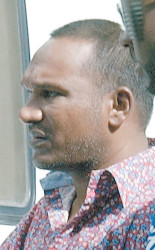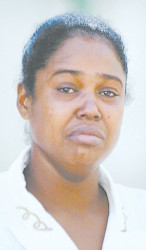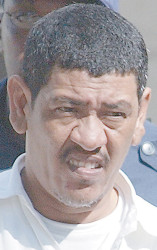Four Guyanese who were sentenced in 2009 to long jail terms in Barbados over drug trafficking have been allowed by the Caribbean Court of Justice (CCJ) to appeal a ruling of the Barbados Court of Appeal denying their application to appeal their convictions because time had run out.

On July 16, the applications of Rohan Shastri Rambarran, Lemme Campbell, Somwattie Persaud and Wayne Gavin Green were considered by the CCJ and the court ruled in their favour against the Barbados Court of Appeal on two points:
- Whether the time for appealing against a conviction begins to run from the date of conviction or from the date of sentence; and
- Whether the Barbados Court of Appeal properly refused to expand the time for appealing the convictions by applicants who had filed notices of appeal against convictions which notices had been dismissed by the court as being out of time.
If the CCJ rules in their favour, the quartet would then be expected to have an appeal of their convictions heard by the Barbados Court of Appeal.
Lemme Michael Campbell, 45, his wife Somwattie Persaud, 40, both of 106 New Garden Street, Queenstown, Georgetown; Christopher Bacchus, 43, and his wife Dianne Bacchus, 37, both of Bay Gardens, Bayland, St Michael; Wayne Gavin Green, 38, of North Ruimveldt, Georgetown and Bridgefield, St Thomas; and Rohan Shastri Rambarran, a 43-year-old businessman of Georgetown, Guyana, were convicted of six counts relating to a police seizure of hundreds of kilos of both cannabis and cocaine at a house in Bay Gardens, St Michael on June 4, 2009.
Lemme Campbell Campbell, whom Justice Goodridge said played a “major role” in the incident was sentenced to 115 years in prison – 15 years for importing, 15 years for possession and 20 years for trafficking in cannabis; 20 years for importing, 20 years for possession, and 25 years for trafficking in cocaine.
- Persaud, whom the judge said played a “subordinate role” in the incident and who was told that “immediate release was not an option” was sentenced to 47 years in prison – ten years for possession of cannabis, 12 years for trafficking of cannabis; ten years for possession and trafficking in cocaine 15 years.
- Christopher Bacchus was sentenced to 47 years in prison – ten years for possession of cannabis; ten years for possession of cocaine; 12 and 15 years for trafficking in cannabis and cocaine respectively.
- Diane Bacchus was sentenced to 47 years in prison – ten years for possession of cannabis; ten years for possession of cocaine; 12 and 15 years for trafficking of cannabis and cocaine respectively.
- Green was sentenced to 47 years in prison – ten years for possession of cannabis; ten years for possession of cocaine; 12 and 15 years for trafficking of cannabis and cocaine respectively.
- Rambarran was sentenced to 125 years in prison – 15 years for the importation, 15 years for possession and 25 years for trafficking cannabis; 20 years for importation, 20 years for possession and 30 years for trafficking of cocaine.

As the sentences were to run concurrently, Campbell was to serve 25 years, Persaud 15 years, Christopher and Diane Bacchus 15 years each, Green 15 years and Rambarran 30 years in prison.
When the applications by the four came up on July 16, 2015 at the CCJ, the Barbados Director of Public Prosecutions argued that the time for appealing had expired on June

25, 2009, 21 days after conviction. The quartet however contended that they had filed their appeals within 21 days of the sentence.
On February 4, 2015, Rambarran also approached the Barbados Court of Appeal seeking an extension of time to appeal. Two of the others followed suit. The Barbados Court of Appeal ruled that it had no jurisdiction to hear the applications and they were in any event an abuse of the process.
In its ruling, the CCJ said “ We think that the issue whether the time for appealing against a conviction pursuant to section 19(1) of the Act runs from the date of conviction or the date of sentence is crucial for the proper functioning of the administration of criminal justice in Barbados and therefore a point of law of great public importance, which needs to be settled in Barbados by the authoritative ruling of a fuller Bench of this Court. Further, if the time for appealing against conviction does not run from the date of sentence as asserted by the Applicants, so that the time for such appeals has expired as held by the Court of Appeal, there is a further point of law that needs to be finally decided by an expanded panel of this Court. The Applicants’ appeals against conviction having been dismissed as being out of time, was the Court of Appeal correct to hold that it could not hear applications from the Applicants pursuant to section 19(2) of the Act for an extension of time to appeal against conviction because it had no jurisdiction to hear such applications which, in any event, were an abuse of process?”





